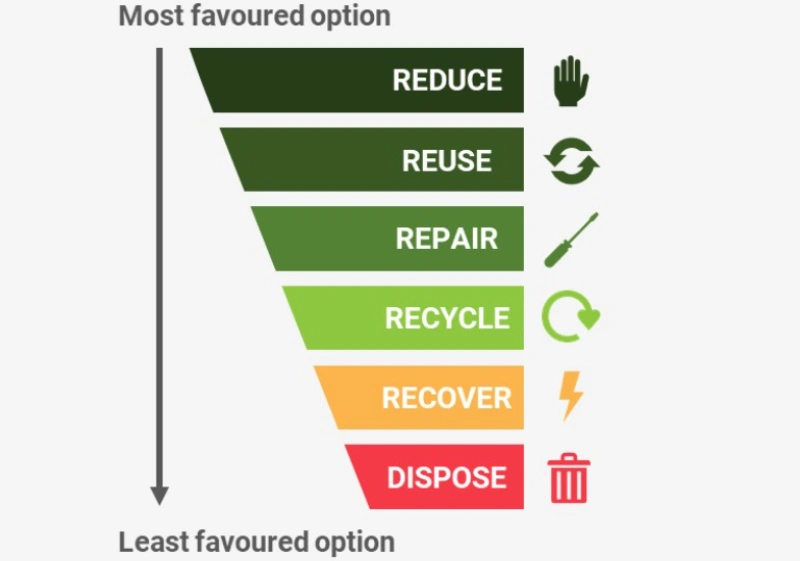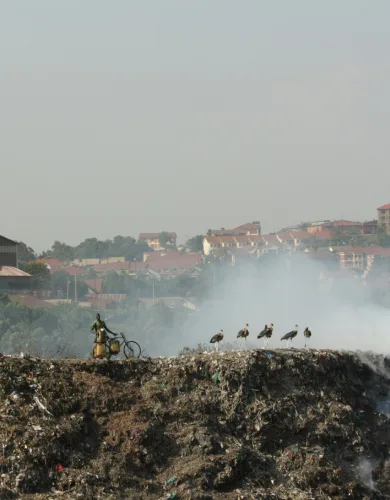Commercial Waste Prevention
The UK government has set a target to eliminate avoidable waste by 2050, and waste prevention (or reduction) is a key component of this strategy.
Waste prevention is an integral part of all businesses’ duty of care, and enforcement of these rules is due to become more strict as regulators push to meet the UK’s waste reduction goals.
💡 Key takeaways:
- Legal obligation: Waste prevention is part of every UK business’s duty of care, so not doing so can result in hefty fines.
- Save costs: Case studies show that waste prevention can benefit a business’s finances.
- Environment: Waste prevention leads to a reduction in greenhouse gas emissions and waste pollution.
What is waste prevention?
Waste prevention (i.e. reduction) encompasses the lower echelon of the legally-binding waste hierarchy. The goal is to avoid waste generation by reducing, reusing, repairing, recycling, and recovering useful goods as much as possible, thus preventing useful goods from going to landfills or incinerators.

Waste prevention only applies in this respect to preventable waste streams, as there are waste types that have to inevitably be disposed of as there is currently no available treatment to make them safe, as is the case of many hazardous, chemical, nuclear and biowastes.
💡 It’s legally binding: The waste hierarchy and, therefore, waste prevention is written within the UK’s devolved legislation. These laws were inherited from the EU’s waste framework during the early 2000s.
Waste prevention strategies
There are four main waste prevention strategies:
Reuse: This involves using items multiple times before discarding them. Reuse can be as simple as using a shopping bag several times or more complex as refurbishing electronics for further use.
Repair: Repairing items extends their life and reduces the need for new resources. It’s particularly relevant for electronics, clothing, and machinery, where repairing can significantly delay the need for disposal (and potentially save costs in the process).
Recycle: Recycling transforms waste materials into new products, reducing the need for ‘virgin’ materials and minimising the environmental impact. Commonly recycled materials include paper, glass, metal, and certain plastics.
💡 Composting: This natural process is a form of recycling of organic matter like food scraps and garden waste into a nutrient-rich soil amendment known as compost.
See our guides on recycling streams typically produced by UK businesses:
- Commercial Recycling
- Dry Mixed Recycling
- Commercial Electronic Waste Recycling
- Commercial glass Recycling
- Commercial waste collection
Recover: Recovery can involve extracting energy from waste materials that cannot be reused, repaired, or recycled. Waste-to-energy plants are an example, where non-recyclable waste is incinerated to generate electricity or heat.
💡 Waste-to-Energy: This recovery process is controversial given it emits large amounts of greenhouse gasses, making it somewhat detrimental and avoidable given the clean energy generated by renewables like wind, solar and geothermal.
How can your business prevent waste?
We can’t emphasise this enough: Every business has a legal responsibility to implement waste management strategies that follow the waste hierarchy (i.e., waste prevention in its many forms instead of disposal). Additionally, the Environmental Act 2021 will soon make enforcing this legislation easier for regulators.
Here are 10 things your business can do to prevent waste:
- Conducting waste audits: Assessing the types and amounts of waste generated can help identify key areas of waste prevention.
- Recycling: Setting up a program for dry recyclables (paper, plastics, metals, etc.), commercial food recycling, and electronic waste collection.
- Going paperless: Encouraging digital communication, record-keeping, and other integrations not only minimises paper use but can make businesses more efficient.
- Optimising packaging: Minimising packaging and considering recyclable or biodegradable packaging. This is most effective when coordinating with suppliers and customers.
- Inventory management: Using technology to avoid overstocking, product expiry or obsolescence.
- Reuse and repair: Refurbish or repair (in that order) used devices and equipment within a business.
- Composting: Composting of biodegradable wastes can generate a helpful by-product in compost.
- Employee training: Employee training and incentive programs are critical to all of these strategies.
- Sustainable procurement: Purchasing products that are durable, repairable, and recyclable and choosing suppliers who are committed to sustainable practices.
- Monitoring and review: Regularly monitor waste management practices and review them to identify areas for improvement.
For specific waste prevention advice from our experts, check out our guides on waste disposal in schools, waste disposal in retail and waste disposal in healthcare.
💡 It’s cheaper: Waste prevention can benefit the company coffers. For example, UK restaurants have saved £7 for every £1 invested in reducing kitchen food waste. See here for more case studies.
The business case for preventing waste
Waste prevention not only ensures legal compliance and is good PR, but it can also help businesses save costs. Here’s a couple of case studies to showcase this:
Britvic UK
Britvic is a renowned soft drinks manufacturer that has achieved significant savings by reducing syrup waste in its production process. By saving 156 tonnes of syrup from effluent per year, Britvic managed to save £117,000 annually, along with an additional £1,400 per year in water and effluent cost savings.1
Ocado
Ocado is a delivery-only supermarket that was built with efficiency and low waste from the get-go in order to compete with the established competition. The company has practically zero food waste, with only 1 in 6,000 products going to waste, which lets them earn more from their stock while avoiding the larger commercial waste collection costs the competition is obliged to pay.1
Co-op Group
The corporate conglomerate achieved a 71% reduction in paper use by transforming their staff’s work routines. They encouraged flexible, digital-focused work practices, leading to significant savings in business waste collection costs and landfill taxes and allowing them to reduce their new building’s scale by one floor, saving £20 million.2
💡 No food waste by 2030: Food waste is the most widely prevented waste stream. It has been the target of devolved policies for many years and shows how businesses can rapidly change their waste habits when this is taken seriously.
Source: 1Wrap.org.uk, 2environmentalpaper.org
The future of waste prevention in the UK
The latest Environmental Act 2021 essentially brings waste prevention into UK law, compelling all UK governments to update their regulations and policies to meet these new legal requirements.
The Act is shifting accountability to businesses across the entire supply chain, from manufacturers to recycling facilities, and improving the regulators’ abilities to enforce any regulations.
For example, Extended Producer Responsibilities (EPR) are in the process of being introduced. These force manufacturers and producers to ensure their goods can be part of a circular economy with minimal waste and are expected to drive innovation in product design.
Enhanced regulation enforcement will also encourage businesses to adopt waste-reducing practices or face fines for not doing so.
Finally, the Act is likely to stimulate advancements in recycling technologies and the development of new markets for recycled materials, further supporting the UK’s journey towards a more sustainable future.
Waste prevention – FAQs
Our business waste experts answer common questions on commercial waste prevention in the UK.
Is there government help for businesses who want to reduce waste?
Yes, the UK government offers various support programs and incentives for businesses to reduce waste. These include grants, tax reliefs, and technical support for implementing environmentally friendly practices.
Find out if your business is eligible for any of these through the following resources:
